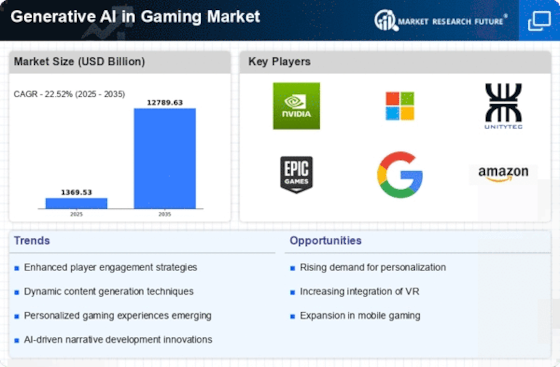Top Industry Leaders in the Generative AI in Gaming Market
Competitive Landscape of Generative AI in Gaming Market
The gaming industry is experiencing a transformative wave with the rising prominence of Generative AI (GAI). This technology's ability to create dynamic, personalized, and ever-evolving gameplay landscapes is attracting significant investment and shaping a compelling competitive landscape. Let's delve into the key players, strategies, and trends defining this burgeoning market.
Top Key Players:
-
AI Dungeon
-
Apex Game Tools
-
Baidu
-
Charisma.ai
-
ChatGPT
-
Electronic Arts (EA)
-
International Business Machines Corporation
-
Kata.ai
-
Latitude.io
-
NVIDIA Corporation
-
Procedural Arts
-
Pyka
Specialized Startups Emerge: Alongside established players, innovative startups like Parametric AI, Xenoma, and PlayQ are carving their niche. Parametric AI's "Galactica" platform empowers game developers with tools for generating worlds, characters, and storylines. Xenoma's focus on procedural animation and behavior generation is changing how characters interact within games. These startups bring agility and fresh perspectives to the market, fostering constant innovation.
Strategies for Market Dominance: The battle for market share in the GAI for gaming market revolves around distinct strategies. Some players, like Microsoft, emphasize cloud-based GAI solutions, offering developers accessible and scalable tools. Others, like Unity, focus on providing development tools and engine integrations that seamlessly integrate GAI functionalities. Building robust developer ecosystems and fostering community engagement are key strategies for attracting and retaining talent.
Factors for Market Share Analysis: Assessing market share in the GAI for gaming space requires consideration of various factors beyond traditional revenue metrics. The number of GAI-powered games developed, partnerships forged with leading studios, and adoption of GAI tools by developers are crucial indicators. Additionally, the quality and diversity of GAI solutions offered, along with user engagement and critical reception of GAI-driven games, play significant roles in determining market leadership.
New Kids on the Block: Emerging companies like Niantic and Epic Games are making their mark with innovative applications of GAI. Niantic's use of GAI for dynamic world generation in "Pokemon Go" and "Pikmin Bloom" is setting new standards for location-based gaming. Epic Games' investment in GAI for procedural content creation within Fortnite's Creative mode showcases the potential for user-generated content powered by this technology.
Investment Trends: The GAI for gaming market is attracting substantial venture capital. Investors recognize the disruptive potential of this technology and its ability to reshape the gaming landscape. Companies like OpenAI, DeepMind, and Unity Technologies are attracting significant funding, fueling further research and development in this domain.
Challenges and Opportunities: Despite the promise of GAI, challenges remain. Ethical considerations regarding data privacy, bias in AI algorithms, and ensuring player agency within AI-driven narratives require careful attention. However, the opportunities abound. Advances in deep learning, natural language processing, and robotics hold immense potential for creating even more immersive and interactive gaming experiences.
Latest Industry News:
Jan 25, 2024: Tencent, the Chinese gaming giant, has announced a strategic partnership with OpenAI, the leading research lab behind ChatGPT and Dall-E 2. This collaboration will focus on developing next-generation AI tools for game development, including character and world generation, dynamic narratives, and adaptive gameplay.
Jan 20, 2024: Unity, the popular game engine provider, has acquired Parametric AI, a startup specializing in AI-powered world generation tools. This move strengthens Unity's commitment to providing developers with accessible and powerful GAI solutions for building immersive and dynamic game worlds.
Jan 18, 2024: Niantic, the developer of "Pokemon Go," is actively expanding its GAI team to further enhance its flagship game and develop new augmented reality (AR) experiences powered by this technology. This indicates Niantic's continued focus on leveraging GAI for creating engaging and location-based gaming experiences.
Jan 12, 2024: Microsoft Azure has announced the launch of its "Azure for Games" platform, offering a suite of GAI tools and services specifically designed for game developers. This move positions Microsoft as a key player in the cloud-based GAI for gaming market, aiming to provide developers with scalable and cost-effective solutions.
Jan 8-12, 2024: The Game Developers Conference (GDC) 2024 featured numerous sessions and demos showcasing the latest advancements in GAI for gaming. From procedural content generation to AI-driven narrative creation, GAI was a major theme of the event, highlighting its growing importance in the industry










